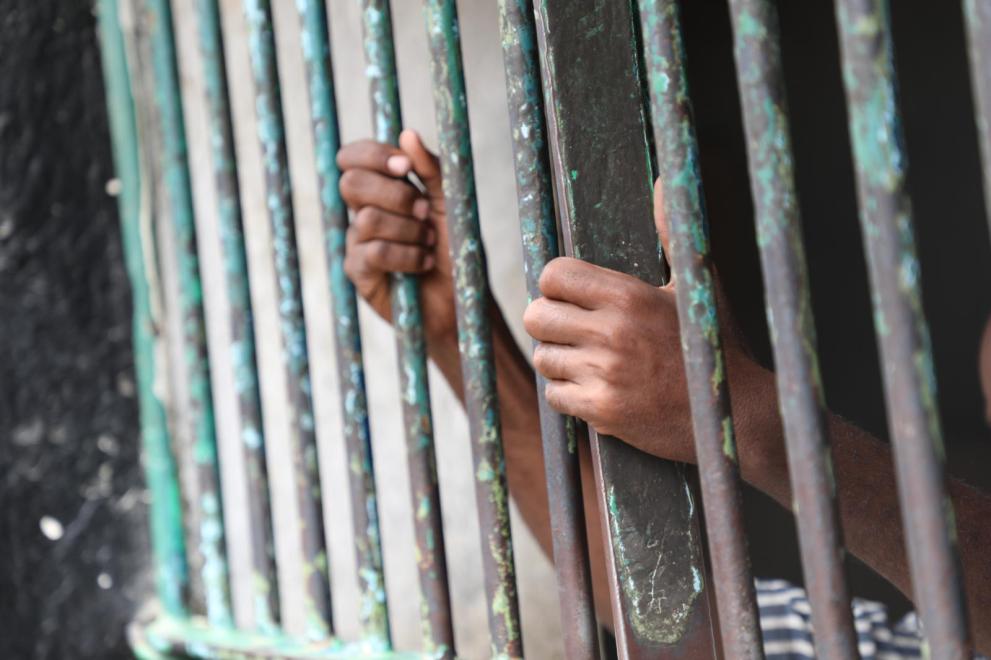
With human mobility globally on the rise, many governments worldwide have increased the use of detention to manage and discourage irregular migration. In Kenya, detention is likewise frequently used to stop and control irregular migrants in the country. The Better Migration Management (BMM) Programme supports a human-rights based approach with a focus on supporting the Kenyan Government to adapt international standards in the management of irregular migration. However, there is a lack of statistics on the exact numbers as well as on the circumstances of migrant detention. With the aim to get details and develop appropriate solutions, BMM supported the Kenya National Commission on Human Rights (KNCHR) in conducting a survey report on migrant detention. ‘We found rampant use of migrant detention as a main strategy to address irregular migration and hence systemic migrant rights violations,’ said KNCHR Deputy Director Veronica Mwangi during the launch of the report on 30 November 2020. Disclosed violations against the migrants include cruel treatment during the arrest, discrimination in prison and a lack of adequate legal, medical, social or psychological assistance and protection for victims of trafficking. As a response, the report recommends an individualised case management that prevents blank detention for migrants.
Some 2,000 migrants are currently detained
Detention is currently used at various stages of processing irregular migrants in Kenya, for instance on arrival and during preparation for repatriation. The 2011 Kenya Citizenship and Immigration Act declares unlawful migration as a criminal offence that is chargeable with a fine of up to 500,000 Kenyan shillings or imprisonment for up to three years or both. Contrary to this, the Global Compact for Migration (GCM) defines migrant detention as a last resort. It is the first common international migration approach, adopted in 2018 by the majority of UN member states – including Kenya. BMM supports the Kenyan Government in the implementation of the GCM. Its commitments are taken into account when drawing up the national migration policy. The KNCHR report was conducted to understand the situation of the estimated 2,000 migrants currently held in detention to create a basis to further rework the processing of irregular migrants in the country. For this purpose, the report combines surveys of 246 migrant inmates (mostly male) and interviews with 175 law enforcement officers. 55 prisons and 120 police stations were visited in total. Both interviewed groups revealed several ways in which migrant rights are threatened in detention where irregular migrants are mixed with convicted criminals.
The treatment during the arrest was assessed as cruel by nearly one in five of the migrant responders. About two out of three indicated that they had to wait longer than the stipulated 24 hours before being taken to court after the arrest. Concerning the imprisonment, nearly every third respondent felt that the quality of health care was inadequate, and 26 percent felt discriminated. These findings signpost needs for action for a process that prevents discrimination against migrants and secures access to justice and information, and a handling that ensures their mental and physical integrity, for instance through food and basic healthcare supply. The report also indicates the need for functional complaint structures for cases in which human rights are infringed. More than one third of the interviewed migrants stated that they found it difficult to make such complaints. The interviewed law enforcement officers discerned risks of human rights violations as well and pointed to challenges they face in dealing with migrants in their facilities such as language barriers and lack of specialised training of the prison personnel.
Improved treatments would also save tax money
Based on these findings, the report promotes alternatives to migrant detention in line with international human rights laws. Recommended measures for these reforms include trainings and capacity building and the establishment or revision of standard procedures for protection, accountability and communication. Above all, an individualised case management is advised that considers factors such as gender, age and the circumstances of the case to decide how to deal with the individual migrant. This would also protect victims of human trafficking from being punished as the committers of the offence. it is also recommended to develop alternatives to detention, like allowing migrants to take up employment in accordance with labour market needs. Such alternatives would not only respect and protect migrant rights, but also save tax money. Based on estimates from the National Treasury, the KNCHR report shows that around 600 million Kenyan shillings could be saved annually with alternatives that process irregular migrants outside the country’s legal system. ‘We will use these findings to engage the government and relevant stakeholders to advocate for necessary reforms to safeguard migrant rights,’ said Mwangi.
You can find the full report here.
Background
The Better Migration Management (BMM) programme aims to improve the safe, orderly and regular management of migration within the Horn of Africa region by applying a human rights-based approach. Promoting and protecting migrant rights is one of its priorities, particularly regarding victims of trafficking and vulnerable migrants. BMM partners with the Kenyan National Commission on Human Rights which is a independent national human rights institution. Members of KNCHR received training on how to apply a human rights-based approach to migration governance and to monitor, report and follow-up on human rights violations of migrants. In collaboration with BMM, KNCHR designed a training module on human rights for its members and other human rights institutions. The programme also facilitates KNCHR’s participation in the Network of African National Human Rights Institutions.
Details
- Publication date
- 23 December 2020
- Region and Country
- Kenya
- Thematic
- Improved migration management
- Partner
- GIZ
